

 |
 |
|
 |

|
| About Us |
|
Read Past Issues | Resources | Composer Links |
Tavener conceived the piece as a way of introducing Western audiences to a different form of listening, The Veil of the Temple was commissioned for the 800-year-old Temple Church, one of London’s most beautiful and historically significant edifices. Second only, perhaps, to Arvo Part, Tavener is a leader of the movement of contemporary composers whose spiritually soaked music sounds both ancient and modern. Born in London on January 28, 1944, John Tavener showed his musical talents at an early age and by the time he entered Highgate School he was already an extremely proficient pianist and organist. He proceeded to the Royal Academy of Music where he won several major prizes for composition. Among his teachers were Sir Lennox Berkeley and the Australian, David Lumsdaine. In 1965 his dramatic cantata The Whale, given in the debut concert of the London Sinfonietta, took its London audience by storm. Since that time Tavener has continued to show an originality of concept and an intensely personal idiom making his a voice quite separate from those of his contemporaries. Major works of the 1980s and early 1990s include Orthodox Vigil Service; The Akathist of Thanksgiving ; The Protecting Veil for solo cello and strings; two large-scale choral and orchestral works, Resurrection and We Shall See Him As He Is; and an opera, Mary of Egypt, written for the 1992 Aldeburgh Festival. Other commissions in recent years include Svyati (1995) for Steven Isserlis, Agraphon for soprano Patricia Rozario and string orchestra commissioned to form the centrepiece of a Tavener Festival in Athens, Vlepondas (1996) commissioned by the European Cultural Centre of Delphi, Hidden Face (1996) for the City of London Sinfonia, The Last Discourse (1997) premièred at St. Paul's Cathedral in March 1998, Eternity Sunrise (1997) commissioned by the Academy of Ancient Music and premiered at the City of London Festival in 1998 and the epic Fall and Resurrection, premièred at St. Paul's Cathedral in January 2000. In October 2000 London's South Bank Centre presented "Ikons of Light", a major three week festival dedicated to his music. His Song For Athene (Alleluia. May Flights Of Angels Sing Thee To Thy Rest) was sung at the funeral of Diana, Princess of Wales. Tavener received a knighthood in 2000 for services to music.
|

|
Commissions 13 New Works Meet The Composer's COMMISSIONING MUSIC/USA 2004 will provide $200,000 to 17 organizations across the USA, supporting the creation of 13 new works by a diversity of composers and artists. Among the highlights:
A complete list of award recipients and their projects is available at Meet the Composer. Old Stuff
|

Infernal Violins Performer(s): Angele Dubeau, Le Pieta Analekta Call
it Angèle meets the devil. Call it crossover. But resistance
is futile.
|

Knoxville: Summer of 1915 / Essays for Orchestra Karina Gauvin, soprano / Thomas Trotter, organ / Royal Scottish National Orchestra / Marin Alsop, conductor Gramophone made this its top pick of the month and it's easy to understand why. The young Canadian soprano Karina Gauvin delivers a drop-dead gorgeous reading of Barber's magical setting of a James Agee poem. Marin Alsop is also excellent in the two Essays for orchestra, works written for Bruno Walter and Eugene Ormandy, respectively. |

Piano Trios 1 & 2 Vitebsk Trio Composers: Shostakovich, Copland Trio Wanderer harmonia mundi Two well-known masterpieces by Dmitri Shostakovich are paired to fine effect with a less well-known ‘Russian’ work by Aaron Copland. Copland’s infrequently heard Vitebsk Trio of 1929 is an early work, based on a Jewish theme the composer heard at a performance of Dybbuk, a play by Shalom Ansky (who was born in the town of Vitebsk). The work combines elements of the neoclassicism and folk style of Stravinsky with experiments in polytonality and microtones. Brilliantly performed by Trio Wanderer. |

Symphony No.1, Phantasmata The Baltimore Symphony Orchestra, David Zinman First Edition First
released on Nonesuch in 1989, this all-world-premiere title, which
did much to bring Rouse’s immense talent to a wider public, boasts 24-bit
newly remastered sound and the complete and lively interview with the composer
conducted by Glenn Watkins. Conductor David Zinman’s close collaboration
with Rouse ensured that the introspective Symphony No. 1 (with its references
to Bruckner and Shostakovich) and the highly surreal Phantasmata triptych
received maximum voice.
|

Tirol Concerto, Passages Dennis Russell Davies (piano) Stuttgart Chamber Orchestra Orange Mountain Philip Glass’ Tirol Concerto for Piano and Orchestra was commissioned by the Tyrol, Austria Tourist Board and had its world premiere at the Tyrol Festival “Klangspuren” in Jenbach, in 2000. While staying in Tyrol, Glass studied sound documents and sheet music of Tyrolese folk-music. In his Tirol Concerto, played here by conductor/pianist Dennis Russell Davies and the Stuttgart Chamber Orchestra, This disc also features selections from Passages, Glass's collaboration with Indian Sitar master Ravi Shankar, as arranged by Davies. |

Rachmaninov Transcriptions, Corelli Variations Olga Kern was awarded the Gold Medal at the Eleventh Van Cliburn International Piano Competition in 2001 - the first woman to garner that honor in over thirty years. On her new release Olga Kern performs a dazzling program of Rachmaninov’s piano transcriptions of of music by Bach, Bizet, Kreisler, Mendelssohn, Mussorgsky, Rimsky-Korsakov, Schubert and Tchaikovsky, his Corelli Variations, and the Liszt Hungarian Rhapsody No. 2 — with Rachmaninov’s own cadenza, transcribed from his recordings. |

Belshazzar's Feast Composer: William Walton Performers: Purves, Lindley, Daniel Naxos Sir William Walton's Belshazzar's Feast, composed in 1930-31, is the finest British choral work since Elgar's Dream of Gerontius, although it is far more "modern." Scored for baritone, choir and orchestra Belshazzar is a compact work lasting just under 45 minutes. It recounts the Biblical story of the downfall of the proud Belshazzar, King of Babylon whose doom is foretold by a ghostly hand writing the chilling prophecy on the wall during a banquet. Walton's dazzling and often times startling music is gripping from the first bar to the last. |

Letter to Warsaw Jane Eaglen, soprano / Mina Miller, piano / Music of Remembrance / Gerard Schwarz, conductor American composer Thomas Pasatieri created this powerful song cycle, setting six texts by poet/cabaret artist Pola Braun, who wrote these texts while in the Warsaw Ghetto and in the Majdanek concentration camp, where she perished in 1943. The poems bear poignant, painful witness to the disruption, forced disintegration and, finally, destruction of daily life of every Jew in Poland in World War II. Pasatieri is best known for his many film orchestrations including Road to Perdition, Finding Nemo, and Angels in America. Here, he takes full advantage of Jane Eaglen's glorious voice and his orchestrations reveal a composer of considerable depth. |
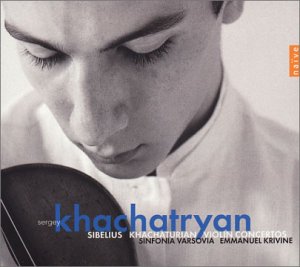
Violin Concertos Composers: Sibelius, Khachaturian Performers: Sinfonia Varsovia, Emmanuel Krivine Naive (Naxos) 18-year-old Armenian wunderkind tosses off the Sibelius with a dazzling display of sheer virtuosity and delivers a much deeper, more sober reading of his fellow countryman's bouncy masterpiece than we are accustomed to hearing. Eye-opening performance and a performer to watch.
|
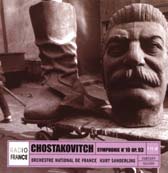
Symphony No. 10 Composer: Dmitri Shostakovich Kurt Sanderling (conductor) Orchestre National de France Naive (Naxos) Re-issue
of an inspired 1978
|

Seven: A Suite for Orchestra Composer: Tony Banks Performer: London Philharmonic Orchestra, Mike Dixon Naxos Tony
Banks, founder of the rock band Genesis, goes "classical" with this
seven-movement suite, each of them an orchestral sound picture using its
title to set the mood. The result is an extremely well-recorded bag
of ambiant musical noodles that are less frivelous than they might have
been and, in any event, less painful to the ears than listening to
Phil Collins sing.
|
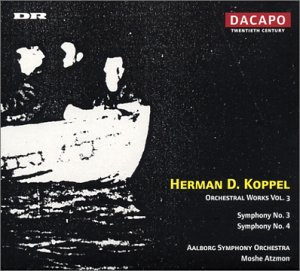
Symphony No. 3 Op. 39. Symphony No. 4 Op. 42 Composer: Herman D. Koppel Conductor: Moshe Atzmon, Aalborg Symphony Orchestra Da Capo [Naxos] During the German occupation of Denmark in World War II, Herman D. Koppel, who was Jewish, and his family had to flee to Sweden, where they met a childhood friend of Koppel who had become a baroness. In her house Koppel could compose in peace and quiet. The Third Symphony is dedicated to her. Despite his own safe surroundings, Koppel’s experience of the war, and of the execution of his Polish-Jewish family in German concentration camps, had a profound impact on his works from this period. These are works of anguish that explore the depths of the composer's emotions--a final liberation from the bloodless influence of his teacher Carl Neilsen--and the birth of major, overlooked 20th century music figure. |

Die Jakobsleiter Composer: Arnold Schoenberg, Henschel, Meier, Nagano Harmonia Mundi One of many important large-scale fragments left uncompleted by Schoenberg at his death, the oratorio Jacob's Ladder was finished by Winfried Zillig, once a student, at the behest of Schoenberg's widow after his death. Schoenberg wrote the libretto between 1915 and 1917 based on the book of Genesis, overlaid with elements from Strindberg's drama Jacob Wrestles, and Balzac's novel Seraphita. He wrote a large of chunk of the music shortly after but was called to the army and never got around to finishing it. This is a brilliant, committed performance that captures a little-known masterpiece by one of the 20th century's greatest composers at the height of his creative powers. |
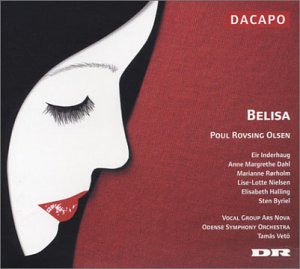
Belisa Composer: Poul Rovsing Olsen Performer(s): Inderhaug, Byriel, Rorholm, Veto Da Capo [Naxos] When composing his music for Belisa, Poul Rovsing Olsen was deeply inspired by Spanish poet Federico García Lorca's drama and by the passionate and demanding character of Belisa herself. The opening scene of the opera is the wedding night of Belisa and Don Perlimplin, where the young bride takes 5 lovers in front of her decrepit groom that is sound asleep. The drama develops from stylized opera buffa into the ambiguous and surreal with an unexpected ending, and Poul Rovsing Olsen's music reflects Lorca’s drama like a sensuous kaleidoscope with French and Oriental overtones. |
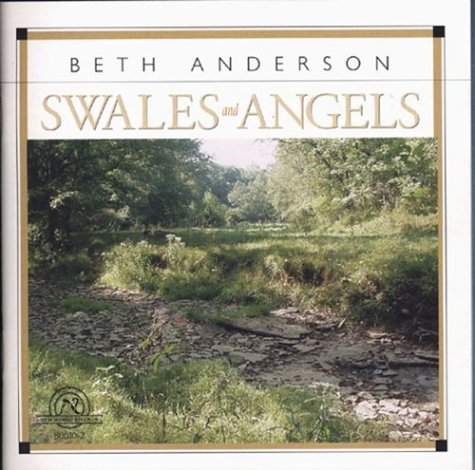
Swales and Angels Composer: Beth Anderson Conductor: Gary M. Schneider Performer: Rubio String Quartet, Jessica Marsten (soprano), et al. New World Records Beth
Anderson's unabashedly romantic "swales" are as pure as a Kentucky mountain
spring, frisky as a new-born colt rolling in bluegrass, and infectious
as a third-grade measles outbreak. They are light, without being
lightweight, and conquer the ear by their deceptively easygoing charm.
If you like Paul Schoenfeld's brand of Americana, you'll like these pieces
a lot.
|
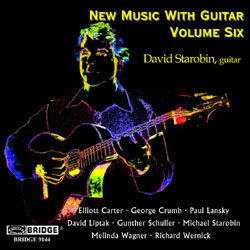
New Music With Guitar, Volume Six Composers: Various Performer: David Starobin Bridge Records No one has done more to champion guitar music by contemporary composers than the brilliant guitarist and co-founder of Bridge Records, David Starobin. This CD includes solo and chamber works written between 1992 and 2000 by Gunther Schuller, Michael Starobin, Richard Wernick, Melinda Wagner, David Liptak, and Paul Lansky--all in premiere recordings. Volume Six also contains George Crumb's "Mundus Canis"--with the composer performing (and whispering and yelling) on percussion. To conclude the disc, Elliott Carter's fantastically inventive sextet, "Luimen" is performed by Speculum Musicae, New York City's virtuoso new music band. |
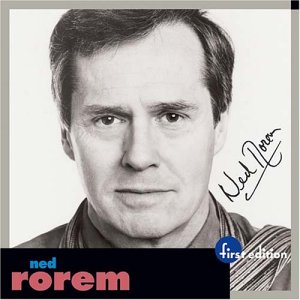
11 Studies for 11 Players: Piano Concerto Composer: Ned Rorem Performer(s): , Lowenthal, Mester, Louisville Orchestra First Edition Rorem ages well and a recent spate of re-releases of his early chamber and orchestral works demonstrate that he is a good deal more than simply a master of art songs. Like most of Rorem's work, 11 Studies is distinctly more European than American and recall Berio's marvelous Sequenzas. |
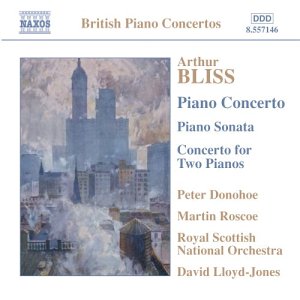
Piano Concerto. Concerto for two pianos. Piano Sonata Composer: Arthur Bliss Performers: . Peter Donohoe, Martin Roscoe (pianos), Royal Scottish National Orchestra, David Lloyd-Jones (conductor). Naxos The piano concerto is rip-snorting, full-blooded, heavy breathing romantism of the Rachmaninov variety played with over-the-top virtuosity by the nimble Peter Donohoe. Listening to it makes you want to invade Russia. |
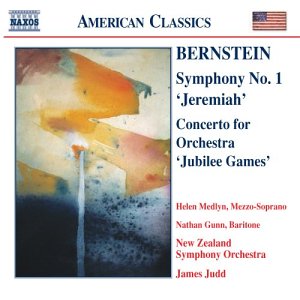
Symphony No.1, 'Jeremiah'. Jubilee Games Composer: Leonard Bernstein Performers: Helen Medlyn (mezzo), Nathan Gunn (baritone), New Zealand Symphony Orchestra, James Judd (conductor). Naxos Young Bernstein, filled with piss and vinegar and more musical ideas per page than any eight of his contemporaries. A joy to listen to a genius in the process of finding his compositional voice. |
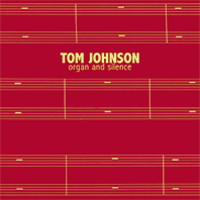
Organ and Silence Composer: Tom Johnson Performer: Wesley Roberts, organ A collection of 28 organ pieces to be played separately or as a long recital A music concerned for, as the author writes in the disc notes, "… the importance of silence in music…". This work is conceived not "for organ" but, really, for "organ and silence", as the silence is a fundamental part of it, and it’s not possible to give it up. It’s an attempt, as the author explain " to permit as much silence as possible, without allowing the music to actually stop". Tom Johnson is one of the masters of minimalism, but he combines this with rigorous logic. His work, free from false glitters, defines, better that any other one, the sense of a research the goes beyond the strict genre definitions, and become poetic application of original ideas. |
 |
Search WWWSearch www.sequenza21.com |
